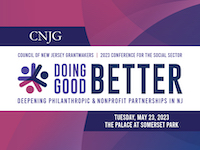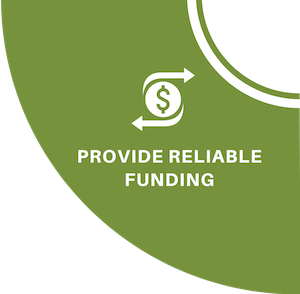Site Search
- resource provided by the Forum Network Knowledgebase.
Search Tip: Search with " " to find exact matches.
How the government can partner with impact investors to unleash new capital, talent and energy for maximum impact.
Multi-year Grants
Affirmation: Multi-year funds provided both reliability and breathing room for nonprofits.
Making fundamental and long-lasting change comes with the promise of reliable investments. Longer grant terms create an environment where collaborative partnerships can flourish, and trust and transparency break down power dynamics. The result is that nonprofits have the “breathing room” and financial stability to focus activities where they are most needed.
Although many funders award grants to the same nonprofits year after year, they often require submission of annual applications that request information they already have and are complex and needlessly lengthy. These processes can heighten mutual distrust. From a practical standpoint, multi-year awards reduce paperwork for both funder and nonprofit and open communication channels promoting shared goals, mutual trust, and increased overall impact.
Activities
• For funders that historically award repeat annual grants to the same nonprofit partners, shift from an annual grant/proposal cycle to a long-term, multi-year commitment with an annual outcomes/progress report in lieu of a full application.
• Tailor grant terms to suit grantee timelines and needs (negotiated outcomes and milestones).
• If data collection is required solely to meet a funder’s compliance requirements, the funder should assume this responsibility or provide sufficient funding and/or capacity for the nonprofit to meet the requirement.
Short-term Outcomes
• The number of funders making multi-year grants increases by 50% over the previous years.
Long-term Outcomes
• More funders convert an annual application process for repeat grantee partners to a multi-year commitment with an annual outcomes report at the most, instead of full proposals each year.
• Funders assume responsibility for data collection or provide sufficient funding and/or capacity for the nonprofit to meet the requirement.
• Grant terms are suited to grantee timelines and needs (negotiated outcomes and milestones).
How to Begin Doing Good Better on Reliability
Learning opportunities
• What barriers keep funders from making long-term commitments to repeat grantee partners? Are any of these barriers legal?
• What are the minimum data requirements for funders to collect from repeat grantee partners?
Pre-Work
• Address the barriers to awarding multi-year grants through tested tools.
• Learn about how multi-year grants strengthen grantee partners and improve philanthropic, nonprofit, and community impact.
• Research mechanisms funders can use to meet legal compliance requirements while gaining trust in their grantee partners.
We are pleased to share Strengthening Philanthropy in Newark - Report to the Field 2015 from the Office of the Newark Philanthropic Liaison. First established in 2007, the Liaison office represents one of the nation’s first formal partnerships between a city and the philanthropic community. The initiative began as a partnership between the Council of New Jersey Grantmakers in collaboration with then Mayor Cory A. Booker. We are proud this unique partnership continues with Mayor Ras Baraka and his new administration.
This report provides a brief summary of some of the substantial activities and impact the Office of the Newark Philanthropic Liaison facilitated throughout 2015. The strategy of collective impact is thriving throughout Newark thanks in large part to the work of the Liaison, and the funding community’s support of and robust engagement with the Office of the Mayor and anchor institutions across the city continue to reap positive outcomes. The Office of the Newark Philanthropic Liaison is supported by: Bank of America, The Foundation for Newark’s Future, Geraldine R. Dodge Foundation, The MCJ Amelior Foundation, The Nicholson Foundation, Panasonic Corporation of North America, The Prudential Foundation, Schumann Foundation for New Jersey, Turrell Fund, Victoria Foundation, and PSEG Foundation providing in-kind support and meeting space.

Date: Tuesday, May 23
Time: 8:00 a.m. to 4:00 p.m.
Location
The Palace at Somerset Park
333 Davidson Ave, Somerset, NJ
The Council of New Jersey Grantmakers is pleased to present our 2023 Conference for the Social Sector on May 23, 2023. The conference theme will focus on our initiative: Doing Good Better, a partnership between the Council of New Jersey Grantmakers and the New Jersey Center for Nonprofits. This long-term initiative aims to shift the culture of the New Jersey philanthropic and nonprofit ecosystem by encouraging funders, nonprofits, and government to create shared power rooted in collaboration, mutual trust, and respect.
The 2023 Spring Conference for the Social Sector: Doing Good Better will explore how funders and nonprofits can address philanthropy’s power imbalances, rethink traditional grantmaking practices to better serve New Jersey communities, and position equity as a driving force. For many years, but particularly in the context of the COVID-19 pandemic, natural disasters, and the heightened outcry for racial equity and social justice, funders have been urged to embrace more flexibility and transparency in their grantmaking. Practices such as general operating support, simplified application and reporting procedures, multi-year funding and others have been shown to level the power imbalance, advance greater equity, strengthen partnerships between funders and their nonprofit partners, and thereby improve community impact. The conference will present strategies and tools including trust-based philanthropy, participatory grantmaking, power redistribution, and others that we can all employ to inform and realign processes, systems, and culture in the social sector. Join foundation, philanthropic, government, and nonprofit colleagues to learn about and leverage these tools. Together, we will discover and strategize how we collectively can "do good better”.
| Agenda | |
| 8:00 - 9:00 am | Registration/Breakfast/Networking/Resource Marketplace |
| 9:00 10:00 am | Opening Plenary |
| 10:00 - 10:15 am | Networking & Resource Marketplace |
| 10:15 - 11:30 am | Breakout Sessions |
| 11:30 - 11:45 am | Networking & Resource Marketplace |
| 11:45 - 1:00 pm | Luncheon Plenary |
| 1:00 - 1:30 pm | Table Discussions |
| 1:30 - 1:45 pm | Networking & Resource Marketplace |
| 1:45 - 3:00 pm | Breakout Sessions |
| 3:00 - 4:00 pm | Ice Cream reception/Networking/Resource Marketplace |
Despite a field replete with research, analysis, recommended policies and practices — not to mention an abundance of educational programs and frameworks for grantmaking to diverse communities — philanthropic leaders have been slow to advance these values in their foundations. Philanthropy Northwest (PNW) wondered: what is getting in the way? Why are good intentions, buttressed with theory and practical advice, not achieving better results on measures of diversity, equity and inclusion?
With the support of the D5 Coalition, PNW began a year-long study to explore these questions. The study was divided into two parts. They began with personal interviews of 23 philanthropic leaders in the Pacific Northwest. In order to better understand how these organizations incorporated diversity, equity, and inclusion into their work and workplaces, they collected baseline information about their staff composition, leadership styles, and organizational practices/policies.
This report details their findings. It includes an in-depth look at the peer cohort model, in which ten foundation leaders met regularly to discuss these issues and support each other in advancing their own leadership. It also includes practical lessons about shifting organizational cultures towards greater diversity, equity and inclusion — lessons drawn directly from the experiences of peer cohort leaders.
PNW presented this work in a webinar hosted by the D5 Coalition. The webinar recording and slides are below.
The New Jersey Historic Trust, an affiliate of the New Jersey Department of Community Affairs (DCA), today approved a total of $14,038,043 in grant recommendations from the Preserve New Jersey Historic Preservation Fund to save and promote historic sites throughout the state. Seventy-one preservation planning, municipal, county, and regional planning, heritage tourism, and capital projects are included in this year’s list of recommendations.
“As the state’s leading voice for historic preservation, the Trust has consistently advanced historic guardianship in New Jersey for the benefit of future generations through education, stewardship, and financial investment programs that protect our traditions and strengthen our communities,” said DCA Acting Commissioner Jacquelyn A. Suárez. “This investment in historic resources will help to preserve New Jersey’s history for generations to come.”
More than $1 million was awarded to more than two dozen local nonprofits by the Bunbury Fund of the Princeton Area Community Foundation.
The grants, totaling $1,035,205, were awarded to 26 nonprofit organizations in 2023. It marks the fifth year in a row that the Bunbury Fund issued more than $1 million in funding.
"Through our experience as Bunbury Fund Advisors, our team continues to learn about the key issues in our region and what it takes for a nonprofit organization to effectively address them, often as a result of undercapitalization," said Jamie Kyte Sapoch, Lead Fund Advisor and former Community Foundation Trustee. "We believe that the capacity building resources approved by the Bunbury Fund in 2023 will result in meaningful, enhanced delivery of missions for the 26 nonprofit organizations listed below."
Nonprofit Finance Fund's Annual Survey chronicles the challenges facing the nonprofit sector and calls out some of the targeted investments we can start to agree on as a society to salvage the investment we have collectively made in our social infrastructure. We believe that a coordinated intervention now will not only better prepare us for inevitable future economic crises; it can lead to a happier, healthier community for us all.

